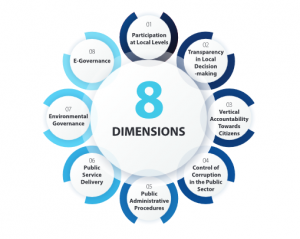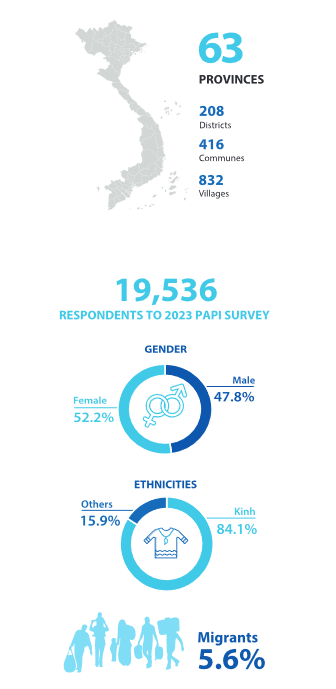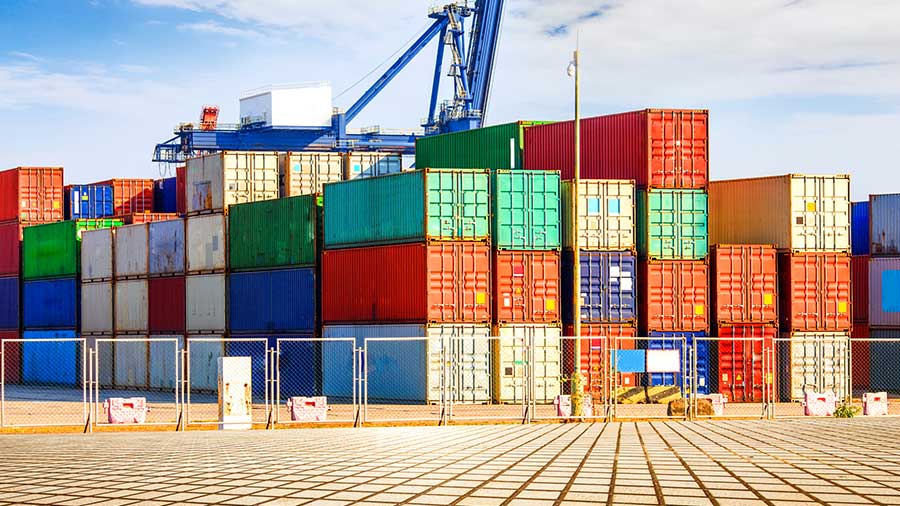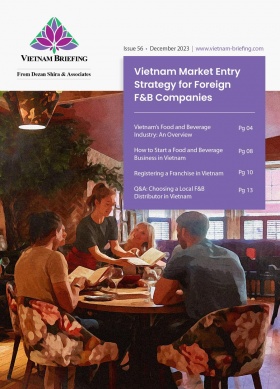UNDP Releases Vietnam PAPI 2023 Report: Progress on Anti-Corruption, E-Governance
In the PAPI 2023 Rankings, Thua Thien-Hue Province in central Vietnam claimed the top spot among 63 localities with 46.04 points. Thai Nguyen and Bac Ninh Provinces secured second and third positions with 45.78 and 45.7 points, respectively.
The 15th edition of Vietnam’s Provincial Governance and Public Administration Performance Index (PAPI) report was released early April 2024. Findings of the report indicates advancements in both anti-corruption measures and the adoption of e-governance systems. Top priorities for Vietnamese the past year were the state of the economy and household finances.
The PAPI report guides Vietnam’s legislative, policy, and operational strategies of all 63 provincial administrations.
The Vietnam Provincial Governance and Public Administration Performance Index (PAPI) serves as a vital policy evaluation tool, gauging citizen satisfaction and experiences with government performance across national and sub-national levels in governance, public administration, and service delivery.
Following its initial pilot in 2009 and a broader survey in 2010, the PAPI assessment has been conducted annually nationwide since 2011. In the 2023 PAPI Report, 19,536 randomly selected citizens were surveyed, bringing the total number of direct interviews since 2009 to 197,779 across Vietnam.
PAPI evaluates eight key dimensions: local-level participation, transparency, vertical accountability, corruption control, administrative procedures, service delivery, environmental governance, and e-government implementation.

It is the fruit of collaboration between the Centre for Community Support and Development Studies (CECODES), Real-Time Analytics, and the United Nations Development Programme (UNDP), with fieldwork coordination support from Vietnam Fatherland Front’s central agencies and their grassroots chapters since 2009.
Over its 15-year tenure, PAPI has received funding from various sources: the Government of Spain (2009-2010), the Swiss Agency for Cooperation and Development (SDC) (2011-2017), the Department of Foreign Affairs and Trade (DFAT) of Australia (2018-2025), the Embassy of Ireland (2018-2025), and the United Nations and UNDP in Vietnam since 2009.

Findings of the 2023 Provincial Governance and Public Administration Performance Index
In the 2023 PAPI survey, progress was observed in the dimensions of ‘Control of Corruption in the Public Sector’ and ‘E-Governance,’ while ‘Transparency in Local Decision-Making’ showed a decline. The remaining dimensions evaluating local governance, public administration, and service delivery remained relatively stable compared to previous years.
The findings hold particular significance for businesses given the prevailing focus on corruption by both governmental bodies and citizens. While there was a slight improvement in citizen perceptions of local corruption control, concerns about corruption still ranked high nationally. Notably, there was a decrease in the perception of corruption as a top citizen concern from 2022 to 2023.
Analysis of the PAPI 2023 survey revealed a perceived decline in various types of corruption, such as diversion of state funds and bribery for various services. However, there was an increase in the belief that informal payments were necessary for securing state employment in 2023 compared to 2021.
Persistent corrupt practices in Vietnam’s local public sector continue to erode citizen trust, particularly concerning nepotism in public office appointments. Control of Corruption in the Public Sector consistently emerges as the dimension most strongly linked to overall citizen satisfaction with local governance and public administration.
Transparency in governance experienced a significant decline in 2023, posing challenges for combating public sector corruption. This decline, especially in budget and expenditure transparency, underscores the importance of accurate information access for holding officials accountable.
E-governance emerged as another key focus in 2023, aligning with the government’s initiative to promote digital citizenship. E-governance serves as a catalyst for improved governance, streamlining administrative processes and enhancing citizen-government interactions. Globally, the introduction of e-governance has reduced opportunities for corruption, particularly in practices directly affecting citizens, such as soliciting bribes for public services.
Positive trends in 2023 include increased internet access and utilization of provincial e-governance portals compared to 2020. However, digital disparities persist, with variations across gender, location, ethnicity, and migrant status. Privacy concerns hinder widespread adoption of e-governance, as noted by one-third of users. Addressing these concerns and implementing user-friendly online service portals are recommended steps towards inclusive and accessible governance services for all citizens.
PAPI 2023 Index: Provincial performance findings
Northern and central provinces typically demonstrate better performance compared to their southern counterparts. Out of the 15 provinces in the High quartile, five hail from the Northcentral and Central Coastal region, while four originate from the Red River Delta. Conversely, among the 16 provinces in the Low quartile, seven are located in the Mekong River Delta and three in the Central Highlands.
The number of provinces showing improvement in performance across dimensions is significant as it indicates which regions have taken action based on previous years’ PAPI findings. In comparison to the 2021 findings, 24 provinces notably improved in Participation at Local Levels (Dimension 1), 12 in Transparency in Local Decision-making (Dimension 2), five in Vertical Accountability Towards Citizens (Dimension 3), 12 in Control of Corruption in the Public Sector (Dimension 4), and 39 in E-Governance (Dimension 8). However, only six provinces demonstrated a significant increase (5 percent or greater) in Public Administrative Procedures (Dimension 5), one in Public Service Delivery (Dimension 6), and eight in Environmental Governance (Dimension 7), respectively. Conversely, 19 provinces performed poorly in Dimension 4, 17 in Dimension 6, and 26 in Dimension 7, respectively.
Local governance and public administration have failed to be inclusive for short- and long-term non-permanent residents in destination provinces. The 2023 survey findings highlight significant disparities between Dak Nong, Quang Nam, and Thai Nguyen compared to nine other provinces and centrally-governed municipalities (Bac Giang, Bac Ninh, Ba Ria-Vung Tau, Can Tho, Da Nang, Dong Nai, Ha Noi, HCMC, and Long An). In Dak Nong and Thai Nguyen, non-permanent respondents provided a more favorable overall assessment than permanent residents. Conversely, non-permanent residents in Dong Nai and Long An reported much poorer experiences in interacting with local governments compared to those in Bac Giang, Bac Ninh, Ba Ria-Vung Tau, Can Tho, Da Nang, Ha Noi, and HCMC.
Like prior PAPI reports, to offer readers and stakeholders a clear view of performance across different dimensions, PAPI categorizes scores into four quartiles: High, Mid-High, Mid-Low, and Low, each representing 25 percent of the 63 provinces. It’s important to mention that two provinces (Binh Duong and Quang Ninh) are excluded from this report due to “their poor data integrity”.
As an aggregate index derived from summing up the scores of each province across the eight PAPI dimensions, PAPI acts as a comprehensive dashboard revealing a province’s governance and public administration performance for a specific year.
Aggregate scores of top ranked regions
Thua Thien-Hue Province in central Vietnam emerged as the frontrunner among 63 localities in the PAPI 2023 Rankings, securing 46.04 points.
Thai Nguyen and Bac Ninh Provinces in the north clinched second and third positions with 45.78 points and 45.7 points, respectively.
Among the five centrally run cities, Ha Noi attained the highest score of 43.9 points, followed by Da Nang with 42.6 points, Hai Phong with 42.1 points, Ho Chi Minh City with 41.7 points, and Can Tho with 40.1 points.
|
Top 8 Leading Localities in Vietnam on PAPI Content Index for 2023 |
||
|
Measure |
Province |
Score |
|
Participation at Local Levels |
Thai Nguyen |
5.91 |
|
Transparency |
Khanh Hoa |
5.88 |
|
Vertical Accountability |
Bac Liew |
4.66 |
|
Control of Corruption |
Soc Trang |
8.15 |
|
Public Administrative Procedures |
Bac Liew |
7.64 |
|
Public Service Delivery |
Thua Thien-Hue |
8.3 |
|
Environmental Governance |
Dong Thap |
4.29 |
|
E-Governance |
Ha Noi |
3.97 |
About Us
Vietnam Briefing is published by Asia Briefing, a subsidiary of Dezan Shira & Associates. We produce material for foreign investors throughout Asia, including ASEAN, China, and India. For editorial matters, contact us here and for a complimentary subscription to our products, please click here. For assistance with investments into Vietnam, please contact us at vietnam@dezshira.com or visit us at www.dezshira.com.
Dezan Shira & Associates assists foreign investors throughout Asia from offices across the world, including in Hanoi, Ho Chi Minh City, and Da Nang. We also maintain offices or have alliance partners assisting foreign investors in China, Hong Kong SAR, Dubai (UAE), Indonesia, Singapore, Philippines, Malaysia, Thailand, Bangladesh, Italy, Germany, the United States, and Australia.
- Previous Article ESG Strategy a Key Focus Area for Foreign Businesses in Vietnam
- Next Article Vietnam’s Imported Meat Market: Growth Drivers and Regulatory Requirements































